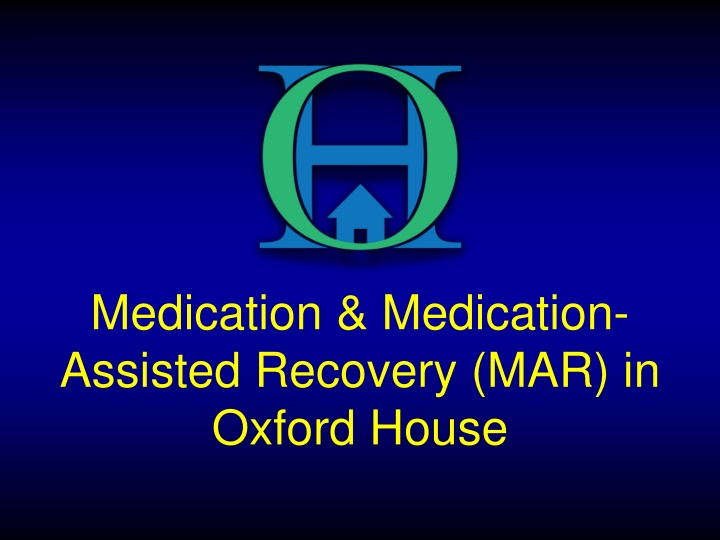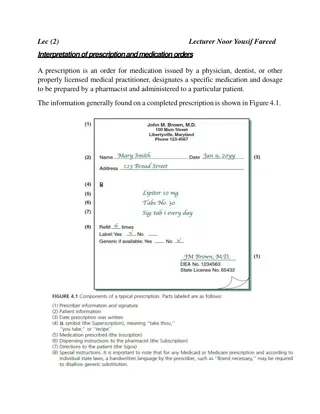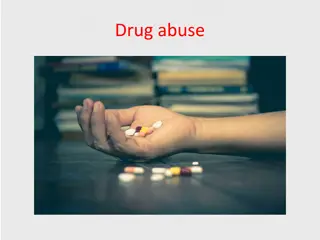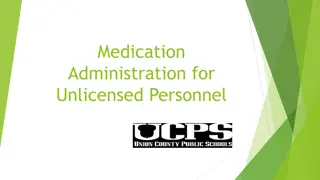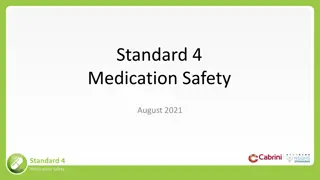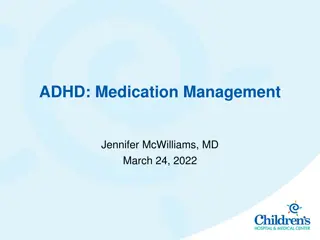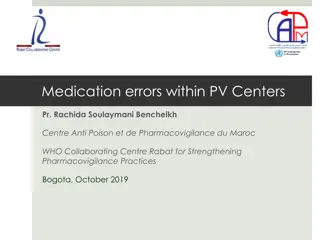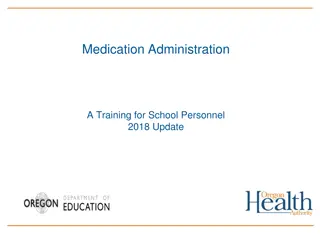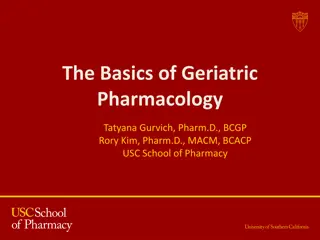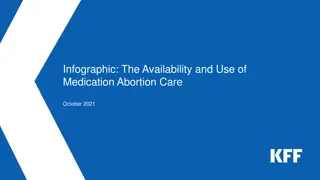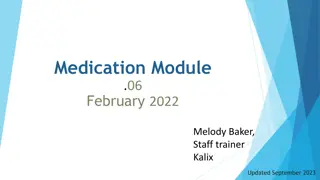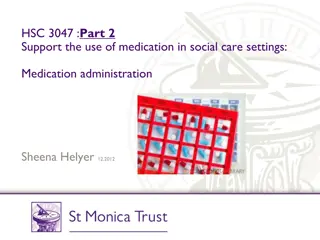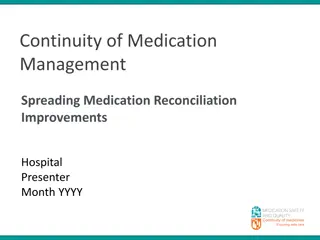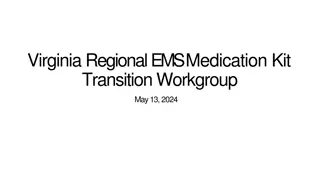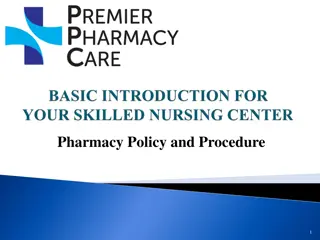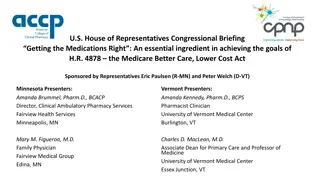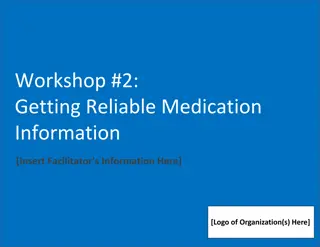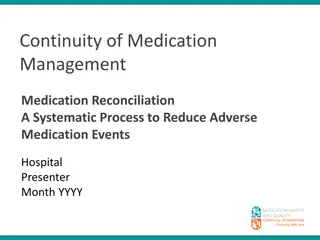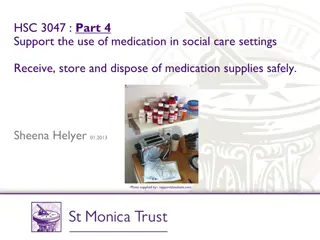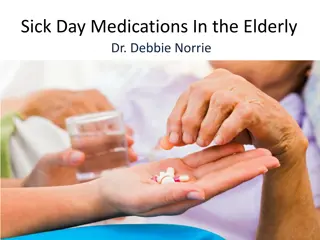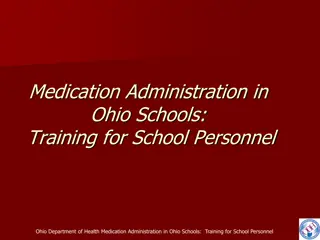Medication in Oxford House: Addressing Controversies and Guidelines
Oxford House's approach to medication in addiction recovery, including controversies, decision-making processes, guidelines, and monitoring practices. Consensus on potentially problematic drugs and the democratic approval process for prescriptions are highlighted.
Download Presentation

Please find below an Image/Link to download the presentation.
The content on the website is provided AS IS for your information and personal use only. It may not be sold, licensed, or shared on other websites without obtaining consent from the author.If you encounter any issues during the download, it is possible that the publisher has removed the file from their server.
You are allowed to download the files provided on this website for personal or commercial use, subject to the condition that they are used lawfully. All files are the property of their respective owners.
The content on the website is provided AS IS for your information and personal use only. It may not be sold, licensed, or shared on other websites without obtaining consent from the author.
E N D
Presentation Transcript
Medication & Medication- Assisted Recovery (MAR) in Oxford House
Medication in Oxford House Controversial issue in Oxford House Addiction specialists: Most physicians know too little about addiction Most dual-diagnoses are wrong Anxiety, depression, etc. are a product of our substance use NOT a separate disease 6 Months for anxiety 1 Year for sleep Most addicts do not need psychiatric medication Only approximately 10% of dual-diagnoses are legitimately separate diseases Over-prescribing of psychiatric medications Historical over-prescribing of pain medication too Purer heroin led to more users Medical perspective on pain Hospitals and patient satisfaction Opioids increase 10X Sedatives increase 4X
Medication in Oxford House Oxford Houses are abstinence, zero- tolerance recovery homes Oxford House model requires decisions about prescriptions be made by house Addicts know what behavior is relapse and what behavior is recovery No policies prohibiting specific medications
Medication in Oxford House Application and Emergency Medical Information Form require all medication information When prescriptions change must be updated What medication you take IS house business!
Medication in Oxford House Consensus on potentially problematic drugs: Benzodiazepines Opioid pain medication Sedatives/hypnotics ADD/ADHD medication Drugs used recreationally/addictively Large majority of prescription medication is completely acceptable
Medication in Oxford House Must provide a letter from doctor Patient is recovering from SUD Patient lives in total-abstinence recovery environment No alternative medication options How long on medication; drug tapering plan House has final say Medications must be approved by democratic process BEFORE prescription filled
Medication in Oxford House Monitoring Check prescriptions and bottles Cannot hold/administer medication House supplies medication lockboxes, require members to secure medication Count pills All medication take as prescribed Misuse/abuse of prescription medication is considered a relapse in Oxford House house decision
Medication in Oxford House Oxford House Tradition 7 House can require member to seek professional help if behavior is disruptive Within an Oxford House group, it is not unusual to find some members who have problems that cannot be dealt with by the group. In those situations, it is not uncommon for the Oxford House members, at a meeting, to strongly suggest that a fellow member seek professional help. In those situations where a member s behavior is disruptive to the group as a whole, the member may be required to seek such professional help.
Medication-Assisted Recovery? What is Medication-Assisted Recovery? Medication-Assisted Recovery (MAR) is the use of medication combined with counseling/behavioral therapies and/or recovery support services to treat opioid addiction, prevent relapse & overdose, and support sustained recovery
What Medications are Used in MAR & How Does it Work? Methadone (opioid agonist) Suboxone Buprenorphine (opioid partial agonist) Naloxone (opioid antagonist) Naltrexone (opioid antagonist) (Vivitrol, ReVia) Occupy brain receptor sites affected by opioids
What Does MAR Do? Relieves withdrawal symptoms & psychological cravings Blocks euphoric & sedating effects of opioids Reduces chemical imbalances in body that can threaten recovery Greatly reduces risk of overdose Helps sustain recovery & reduce relapse Permits return to normal, productive & law- abiding life
Some Outcomes Supported by Research Decreases death rates by 50% or more Reduces transmission of HIV, Hepatitus B & C, and other diseases Eliminates or reduces illicit opioid use Reduces criminal activity Enhances productive behavior via employment and academic/vocational performance Improves overall health and social functioning
Some Outcomes Supported by Research In reviews of evidence-based treatment practices, MAR is consistently referred to as the gold standard Medical research agencies that emphasize MAR as gold standard of treatment National Institute on Drug Abuse (NIDA) Substance Abuse and Mental Health Services Administration (SAMHSA) National Institute on Alcohol Abuse and Alcoholism (NIAAA) Centers for Disease Control and Prevention (CDC) Numerous other agencies/research institutes/medical research universities
Misconceptions About MAR MAR Impairs physical or mental functioning NO when provided at appropriate dose No adverse effects on intelligence, mental capacity, physical functioning, or employability Research shows MAR patients = non-MAR with reaction time, ability to learn, focus & making complex judgements MAR is only for short term Appropriate dose and duration determined by certified health care professional calibrated to individual medical/physiological needs Research shows MAR for 1-2 years leads to greatest rates for long-term success, enhancement of productive behavior via employment and academic/vocational performance No evidence to support benefits from cessation With long-term abstinence, under physician s direction, free of stressors can attempt dose reduction or cessation
Misconceptions About MAR MAR trades one addiction for another, is a crutch that hinders true recovery Research shows that MAR with behavioral therapies successfully treats addiction and helps sustain recovery Research shows that MAR assists in recovery by improving quality of life, level of functioning, and the ability to handle stress More importantly MAR reduces mortality at the beginning of recovery MAR increases risk of overdose MAR helps prevent overdoses Even one use of opioids after detoxing can lead to fatal overdose After detoxing tolerance to euphoria remains higher than tolerance to respiratory depression
Medication-Assisted Recovery & Narcotics Anonymous (NA) Bulletin #29 (1996), Pamphlets N.A. Groups & Medication (2007) & Narcotics Anonymous and Persons Receiving Medication-Assisted Treatment (2016) Limits on participation (sponsoring, service positions, even sharing) MAR is not recovery: To preserve an atmosphere of recovery in our meetings MAR is not abstinence: NA may be compatible for addicts on medically assisted protocols if they have a desire to become clean one day.
William White Report on MAR & NA Critical of N.A. s position Positing recovery as a journey of self- transformation, the methadone patient subsists in undetermined space a hinterland beyond the clearly demarcated identity fissures of addict or recovering addict Interviews: Simultaneously expressing respect and appreciation for N.A., confusion, shame, a demeaned status, hurt, anger and increased defiance related to limitations, and then avoidance/abandonment of N.A.
Medication-Assisted Recovery in Oxford House Originally prohibited: World Convention Resolutions: 2000 (2nd), 2003 (5th) & 2006 (8th) Prohibition lifted: 2010 World Convention Skepticism initially remained
Medication-Assisted Recovery in Oxford House Oxford House emphasizes its own status as evidence-based (SAMHSA NREPP) and the gold standard of recovery residences Oxford House embraces multiple pathways to recovery Oxford House Tradition 4
Medication-Assisted Recovery in Oxford House Some perspectives on the evolving question of MAR It IS the present and future of treatment The antidepressant analogy
Medication-Assisted Recovery in Oxford House: The Law Federal non-discrimination laws protect people utilizing MAR Americans with Disabilities Act (ADA) Fair Housing Act (FHA) It is a violation of federal law to discriminate against MAR participants in housing Same legal protections Oxford House has appealed to for over 30 years
Medication Assisted Recovery in Oxford House An Oxford House may not refuse an applicant an interview because of their MAR status An Oxford House may not vote not to accept an applicant because of their MAR status Oxford House Tradition 5 Limitations to autonomy Houses jeopardize the entire Oxford House organization when they violate federal law. It will not be tolerated
Medication Assisted Recovery in Oxford House Monitor like other medications Cannot hold/administer medication Require member to secure medication Count medication All medication taken as prescribed Misuse/abuse of prescription medication is considered a recurrence of use in Oxford House house decision Pay attention to behavior!
Medication Assisted Recovery in Oxford House Have compassion and empathy for newcomers PEOPLE ARE DYING 2021 106,699 fatal overdoses highest ever in history 290 deaths per day A death every 5 minutes 36 more since opening remarks yesterday morning They re dying in our homes, designed to save lives
Medication-Assisted Recovery in Oxford House Don t let Oxford House be another recovery community that alienates and abandons this growing group of people desperately seeking recovery Make it a haven of love and support for many pathways to recovery! PLANT THE SEED OF RECOVERY
Mutual Support Group Participation in Oxford House TRADITION 7 it is inconsistent with the Oxford House concept to have a requirement placed on members to utilize the services of psychiatrists, doctors, or even the program of Alcoholics Anonymous or Narcotics Anonymous except in very special circumstances Frequently go to AA/NA meetings but rely on attraction rather than mandates (Proscriptive) Houses may not have a standing requirement for mutual support group meeting attendance.
Mutual Support Group Participation in Oxford House TRADITION 4 Every Oxford House member attributes his sobriety to Alcoholics Anonymous and/or Narcotics Anonymous. Each Oxford House member, as an individual, considers himself a member of AA and/or NA. the members of Oxford House have found that only by being active in AA and/or NA have they found comfortable, long-term sobriety... (Descriptive) This description of Oxford House membership at large is no longer accurate. Variety of mutual support groups Lack of participation in any support groups/therapeutic practices occurs sometimes now
Mutual Support Group Participation in Oxford House TRADITION 7 If a house member does not regularly attend AA or NA meetings, the house may as a group conscience decide that an individual resident should attend a set number of meetings each week for both the individual s well-being and the well-being of others who live in the house. TRADITION 4 If a resident s non-attendance at AA or NA meetings is causing problems for the individual or the house the residents may vote at a meeting to make meeting attendance for a particular member a condition of living in the house. In this situation the group conscience should be the determining factor. It is guided by the fact that the welfare of the house must always come first.
Mutual Support Group Participation in Oxford House Oxford House embraces Multiple Pathways to Recovery many mutual support group organizations (not just AA/NA) When you stop growing, you start dying. William Burroughs You re either growing or dying. Stagnation does not exist in the universe. Steve Siebold Do not deny your house members the promise of long- term recovery that the Oxford House Model can give us WE MUST HOLD EACH OTHER ACCOUNTABLE TO ACTIVE PARTICIPATION IN THERAPEUTIC PRACTICES MUTUAL SUPPORT GROUP PARTICIPATION
